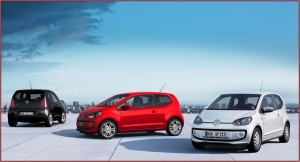In the latest round of eco press releases, German Volkswagen Group said it will be “electrifying” all of its vehicle classes starting with 14 electric and hybrid models by 2014. Speaking before the opening of the Frankfurt Motor show, Martin Winterkorn, CEO of VW Ag said the company wants to win new customers with electric vehicles that are technically mature, practical in use, safe and affordable.
The VW Group is showing an all-electric e-up!, an e-Golf, as well as the Audi A3 e-tron plug-in hybrid and a Porsche Panamera S E-Hybrid along with a plug-in model at Frankfurt.
The two-door, four-seat e-up! at 3.54 meters is seven inches smaller than the Mini, and competes with Alfa Romeo MiTo, Fiat 500 and in Europe the Toyota iQ. Japanese maker Toyota, much to the embarrassment of the Germans, is the clear hybrid leader in global sales, and will show at least one new model, a Yaris Hybrid-R, at Frankfurt later this week. (Read Tiny Three-Cylinder VW Up! to Debut at IAA Frankfurt Toyota to Retail Hydrogen Fuel Cell Hybrids in U.S. by 2015, and Driving the 2013 Lexus LS 460, F Sport and 600hL Flagship Sedans)
While optimistic auto executives will gush about their latest offerings at the Frankfurt Motor Show, the Eurozone crisis continues unabated putting extreme pressure on automaker profits and threatening ambitious research and development programs. The Volkswagen Group was bit by the Eurozone crisis as Q2 profits sank 11% in Q2 to €2.85 billion or ~$3.78 billion. Europe’s largest automaker by far, headquartered in Germany, Europe’s largest economy by far, has revised full-year estimates down to simply equal the €11.5 billion it reported for 2012. Even that might be a stretch given the European auto market, which is headed for its sixth straight year of declines and running at sales levels last seen two decades ago. (Volkswagen Group Euro-Bit. Q2 Profits Drop 11% to €2.85 Billion)
According to Winterkorn: “The electric car cannot be a compromise on wheels, it must convince customers in every respect.” He said that environmental compatibility and sustainability were increasingly becoming the main purchasing criterion.
“From the zero-emission city car, through the plug-in hybrid all-rounder to the three-liter sports saloon [sedan in EU speak]. It is our customers who decide for themselves just how much e-mobility they want.” He went on to say that electric-drive vehicles were a key building block for achieving the ambitious climate protection targets, and that the plug-in hybrid had the greatest market potential.
In Europe, Volkswagen Group brands currently offer 420 models with maximum CO2 emissions of 130 grams per kilometer, 302 models emitting a maximum of 120 g/km, 50 models emitting up to 100 g/km and 23 models emitting 95 g/km or less. The Volkswagen XL1 plug-in hybrid has the lowest emissions, and a claim as the most efficient production vehicle with CO2 emissions of 21 g/km, consuming 0.9 liters of fuel with a range of 500 kilometers.


